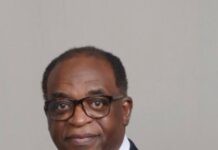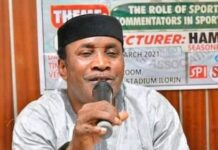Precisely two decades ago, the General Ibrahim Babangida Military Junta aborted the popular Mandate freely given by the Nigerian people to Moshood Kashimawo Olawale Abiola, in an election widely regarded as the freest and fairest in the in history of this country; and one of the most credible in the African region.
The sequence of sad events following the annulment of the election, and the resulting upheavals led to the destruction of numerous lives and property, the relentless pursuit and incarceration of many, including MKO Abiola. It also resulted in the vicious assassination of Abiola’s wife, Alhaja Kudirat Abiola; Pa Alfred Rewane, several others and ultimately the regrettable death of Abiola in government’s custody, few hours before his supposed release.
Now, a lot has been said and written on the circumstances surrounding Chief Abiola’s untimely and tragic death, and there has been a great deal of conspiracy theories; most Nigerians suspect that he might have been poisoned to death contrary to the autopsy report and the forensic and chemical analysis of an International team of pathologists that his death was due to a heart condition. The testimonies given during the Justice Chukwudifu Oputa led Human Rights Violation and Investigations Commission (HRVIC) particularly that of the “Tea Story” further reinforced this suspicion. But Nigerians are not alone in this; former United Nations (UN) Secretary General and Nobel Peace Laureate, Kofi Annan re-echoed this suspicion in his Memoirs, entitled, “Interventions: A Life in War and Peace.” In Chapter Five of the book, titled, “The Fate of the Continent: Africa’s Wars, Africa’s Peace,” he wrote the following on Nigeria, Abiola, the June 12 Struggle and the Abacha and Abubukar Military Juntas:
“Earlier…an unknown Nigerian Secret Service Officer-An Agent of the five-year, brutal Military Regime of the recently deceased General Sani Abacha-unexpectedly knocked on the door of Lamin’s Abuja Hotel Room. “Sir, I’m here to inform you that the Secretary-General is to see Mr. Moshood Abiola immediately,” he said…Moshood Abiola had been imprisoned and in solitary confinement since 1994. Previously he had been a millionaire businessman…But in 1993, there was a short-lived attempt to introduce democracy, and Abiola entered the presidential race. When Abiola looked entirely set to win, the final and full count was never allowed by the reigning military government of President Ibrahim Babangida; even though he had set up the elections in the first place…the vote changed his relationship with the government. He had acquired an unprecedented swell of support from many sides of the ethnic and religious divides that criss-crossed Africa’s most populous country. When President Babangida was ousted from power and replaced by General Sani Abacha later that year, in the midst of Nigeria’s deepening financial crisis, the new president dissolved the institutions that had been formed to move the country toward a semblance of democracy…But in the unfolding chaos of Abacha’s rule, Abiola stepped forward in 1994 and, on the basis of the thwarted 1993 elections, announced to a huge crowd of supporters in Lagos that he was the legitimate president of Nigeria. He was immediately arrested and charged with treason and spent the next four years in solitary confinement. During this time, he was denied access to even radio, saw no one from his family from 1995 onward, was unable to talk to anyone else, and was shown only one newspaper article: a report on the assassination of one of his wives in 1996. The only other reading materials he had were a Bible and a Koran…But on June 8, 1998, Abacha unexpectedly died. General Abdulsalami Abubakar was installed as his replacement the next day. I had met Abubakar previously, when he was accompanying Abacha at a summit in Lome, Togo, in January 1997…I found him reasonable in outlook and straight speaking, in contrast to the strange, quiet character of Abacha…he, as he later revealed to me, was scared. The country was entirely isolated internationally after repeatedly refusing to change its political course or release political prisoners, and could count on little outside help; it was in a terrible financial position with a crippling high debt; Abacha had antagonised the country’s power bases, which had brought growing unrest and violence onto the streets; the military (dominated by the Hausa ethnic group) was used to its privileged position in society and was not going to give this up easily; and while Abubakar recognised the necessity of democracy to ensure the country’s political sustainability, a mismanaged and sudden introduction of elections could bring even more instability…Part of the problem for Abubakar was how to deal with the imprisoned Abiola. If released, he could still upend the political balance in the country if he demanded the presidency as he had before. Such a move would be backed by his mainstay of supporters in the South-west of the country, but almost certainly rejected by the military…A few weeks after Abubakar came to power—on June 22, 1998, at 3.30 pm—I had one of these sessions with Nigeria’s foreign minister, Tom Ikimi…Ikimi’s style was unrecognisable in comparison to the one he had displayed while serving Abacha. Previously, he had lectured me and others, at length, on how the internal affairs of Nigeria were solely the government’s business. That bold front was now giving way to realism: recognition of the truly interdependent world of which Nigeria was a part…I’m willing to publicly give my approval for the president’s plan,’ I said, as Ikimi’s eyes visibly lit up. ‘But only if Abiola is released.’ Ikimi looked taken aback. But he replied that if I came to Abuja personally to voice my support of Abubakar’s election proposals, then Abiola could be released. I accepted the invitation to visit…On arrival, I met with President Abubakar to discuss the situation. He emphasised everything Ikimi had said in New York, and I pushed him to move on his promises, to open up the political system and to bring in civil society, to build the momentum in his favour in order to keep the country on course…I also reminded him that Abiola needed to be released if he was to obtain international goodwill—and mine…Abubakar wavered slightly. He pledged his willingness to release Abiola immediately, but under the condition that he made no attempt to reclaim the presidency. I could see the general’s concerns: if Abiola came out and demanded to be instated as president, it could cause a deep and violent split that, given the fragile conditions, could take the country to goodness knows where. Abiola’s release was necessary, but it also needed to be a calm process. I asked if I could see Abiola, to discuss this problem, and Abubakar said it would be arranged. It was later that night that Lamin heard the knock on his door, and we found ourselves speeding along Abuja’s dark roads to Abiola’s current holding place. We pulled up at a location near the presidential palace, and sullen guards walked us inside the guest house-like building into a simple, bare room with white walls, where I found him sitting quietly. After exchanging greetings, I explained that I was in discussions with the president and the junta concerning current developments in Nigeria, and I was pressing them for his release. He seemed remarkably ambivalent. I asked if he wanted to claim the presidency once he was out, which I told him I was confident would happen very soon. He said he was not sure, commenting that the junta would be afraid if he did. He seemed to be hedging his bets, not wanting to be drawn into a firm answer. Suddenly, he switched his interest and asked,
‘But who are you?’ ‘I’m Kofi Annan,’ I replied. ‘I’m the secretary-general of the United Nations.’
“‘What happened to the other one? The Egyptian?’ He said, surprised.
I had mistakenly assumed that Abiola had been told who was coming to see him and why. All he had been told was that an ‘important person’ would visit. It was amazing the isolation in which this man had been kept—the regime was so used to keeping him in the dark, they maintained his ignorance of anything going on outside even now. Once he realised who I was, he became more enthusiastic. He also became more explicit regarding his plans. He said he had no intention of claiming the presidency. All he wanted was go to Mecca to pray and give thanks. But he emphasized that he would make no commitment in writing. If he did so, he felt this would destroy his reputation. But he said he was willing to give the same assurance to President Abubakar. I conveyed this assurance to Abubakar the next day, but he was still hesitant. I explained that a free Abiola, who had no interest in upsetting the situation, would be a calming influence on his supporters, not an agitating one. I then told him that I would be announcing in my departing speech to the press that the president had promised me he would release Abiola and the other prisoners very soon. Whether this speech reinforced his credibility or undermined it would now depend upon him. In the ensuing press conference, given shortly before our flight out of the country, I did as promised. But I also revealed that Abiola had, indeed, told me that he had no intention of claiming any right to the presidency, further removing any justification Abubakar held for not releasing him and also smoothing the path ahead with Abiola’s more hard-line supporters. I was also trying to ease the concerns of those Nigerians who feared Abiola’s return. On our return journey, everything seemed set for Abiola’s release. But tragedy struck a week later when Abiola collapsed and died during a meeting with U.S. Under-Secretary of State Thomas Pickering. Despite the earnest intentions we had detected in Abubakar, the timing could only be considered suspicious. However, an international team of pathologists established that it was the result of heart condition, and there was no foul play—other than the fact, I thought that Abiola had been denied adequate medical care throughout his incarceration. Either way, he was yet another casualty of the systematic violations of a whole range of human rights that are inevitable under personalised and oppressive regimes.”
Annan’s accounts of the events of 1998 in Nigeria, and of Abiola’s premature death are a watershed; his records are remarkable and suggest a lot of things, particularly, since his concluding remarks on them are inconclusive. There are just so many unanswered questions, and we might never find the answers. Why for instance, didn’t Annan as Secretary General of the UN insist that Abiola be released first before giving approval and credibility to the plan of the Abubakar Military Regime? Was that simply an oversight? Why his sudden death just when the Regime was to putatively released him? Was it a mere coincidence? And why were there no Africans among the International team of pathologists that carried out the autopsy, forensic and chemical analysis on Abiola? Was that what the family wanted? Perhaps, if the International team of pathologists had been more inclusive, their findings as released would not be so easily discounted by many here. The timing as Annan rightly said could only be considered suspicious, but again, that doesn’t tell us anything. Also, the “Tea Story” from the HRVIC added a vital weight to the whole issue, and it has endured; but there remains a shadow of doubt and a serious lapse on the proceedings of the HRVIC as it failed to either invite or give opportunity to all the key actors, notably the foreign ones, and especially those players present at his death to appear before it to testify, make depositions or state their side of the story. If that had been done, it would have helped a lot to clarify some of these issues. Annan’s book itself is very insightful, and chronicles failings after failings, delays, blame games, uncritical self-satisfaction, and a world riddled with tyranny. It is an account of democratic governments, and world leaders failing to act in hotspots across the globe while the UN looks on helplessly, stuck in red tape; despite its huge annual budget of billions of dollars and a bloated staff of over forty thousand. And so, as the Nigerian people in general, and the Abiola family in particular continues to search for answers to some of these things, it is certain that the debate on the events of those days would be sustained. Who knows? We may yet learn something. No doubt, this would continually be a source of pain for the Abiola family, but it would be good for them as well, and more importantly, for Nigerians who deserve to know what truly happened. There has to be a closure for the Nigerian people, because in the last fifteen years since Abiola’s death, there have been so much conspiracy theory, and his family and indeed the entire nation need to find out what actually took place in those dreary days.
On the last look, we call on the government of the day to remember that so many Nigerians suffered excruciatingly, and several others like Abiola paid the supreme sacrifice for the Democracy the nation has now, and those in government must ensure they safeguard this Democracy, and accordingly, honour these martyrs of Freedom by passing legislation making June twelfth, a Democracy day, in place of the May twenty-ninth date. We know the government at the centre will do nothing about this, so it is incumbent on the opposition, notably the Action Congress of Nigeria (ACN), which has reasonably influence in the National Assembly to make this come true.
With unyielding hope,
Eneruvie Enakoko
Editor in Chief & Chief Executive
Conscience Reports



